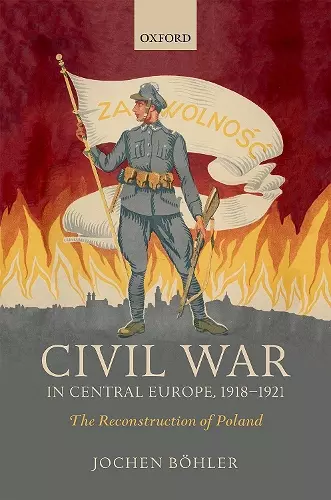Civil War in Central Europe, 1918-1921
The Reconstruction of Poland
Format:Hardback
Publisher:Oxford University Press
Published:29th Nov '18
Currently unavailable, and unfortunately no date known when it will be back
This hardback is available in another edition too:
- Paperback£28.49(9780192867018)

The First World War did not end in Central Europe in November 1918. The armistices marked the creation of the Second Polish Republic and the first shot of the Central European Civil War which raged from 1918 to 1921. The fallen German, Russian, and Austrian Empires left in their wake lands with peoples of mixed nationalities and ethnicities. These lands soon became battle grounds and the ethno-political violence that ensued forced those living within them to decide on their national identity. Civil War in Central Europe seeks to challenge previous notions that such conflicts which occurred between the First and Second World Wars were isolated incidents and argues that they should be considered as part of a European war; a war which transformed Poland into a nation.
...[T]he book is definitely very important and valuable: it shows the formation of the Polish state in a new light that undermines traditional nationalist historiography and popular ideas...The book allows us to go beyond nationalist conventional wisdom. * Krzysztof Jaskulowski, SWPS University of Social Sciences and Humanities, Nationalities Papers *
[an] intriguing and thought-provoking study ... There is no doubt that this book will find a well-deserved place in the growing body of historical works on East and Central Europe. It challenges the nationally oriented narrative of nation-making, and offers a fresh perspective, which invites us to rethink the role of violence in the creation of nation-states in the post-imperial era. * Tomas Balkelis, Lithuanian Historical Studies *
The author regarded it as crucial not to look for new facts, but to find a balance between the facts already presented and to consolidate them. He did it brilliantly. Thanks to the author, the reader is presented with a synthesis of secondary literature, and thus also by a holistic historical narrative, which was hitherto lacking ... The book serves as a signpost, providing the necessary historiographic overview ... By means of source diversity the author is able to sketch a hitherto unpresented picture of violent excesses. The book is written very legibly, which will certainly be welcomed by both the lay and professional public ... The study helps to understand the interbellum and subsequent crimes of the Second World War, the origin of which is often found in the wrongs of the violent period following the First World War. * Jan Kutílek, Slovanský p%rehled [translated] *
The last chapter finally deals with "Violence and Crimes Beyond the Battlefields", with Böhler also relying on archive finds and diaries ... In this chapter, Böhler focuses on the regional level, where political goals were often of secondary importance. In the countryside, small paramilitary groups were masters of life and death. As reports from the high command and local authorities show, in 1919 and 1920, crime, corruption and banditry were the order of the day. Pogroms against Jews were particularly perpetrated by soldiers, led by officers with little experience and close ties to the national democracy. With the successful formation of the state, the violence subsided ... Böhler has succeeded in shedding more light on a dark chapter in Polish history. * Detlev Brandes, Historische Zeitschrift [translated] *
This book contributes not just to rising scholarship on European paramilitary violence at the war's end, but to wider areas, such as the social history of warfare in twentieth-century Europe, nationalism and "national indifference," border studies, and transnational history, in addition to the interwar history of Poland and Central and Eastern Europe. * Peter Polak-Springer, Qatar University, Journal of Modern History *
Böhler's work successfully challenges both established and mythical narratives of Polish nation-building, revealing the contingent and violent nature of Poland's struggle for land and loyalty after World War I. * Brendan Karch, Louisiana State University, Central European History *
Jochen Böhler's book is, without a doubt, important. Any scholar of twentieth-century European history will find it worth reading, and particularly useful when considering the question of the reconstruction and re-emergence of Central European nation-states after the Great War. * Pawel Markiewicz, Slavonic and East European Review *
According to Böhler, "self-determination" was an unsuitable recipe for structuring a multi-ethnic region. This becomes particularly clear in his fourth chapter "Violence and Crimes Beyond the Battlefields", in which Böhler draws a panorama where anti-Semitic pogroms, skirmishes, violent oppression of the rural population and death blend into each other. Hunger, disease and other hardships plagued the country. [...] Böhler has presented a differentiated description of these violence scenarios, largely reconstructed on the base of a variety of sources. * Jost Dülffer, editor of Peace, War and Gender from Antiquity to the Present. Cross-cultural Perspectives *
- Winner of Joint winner of the 2019 Kulczycki Book Prize in Polish Studies.
ISBN: 9780198794486
Dimensions: 240mm x 163mm x 25mm
Weight: 574g
268 pages